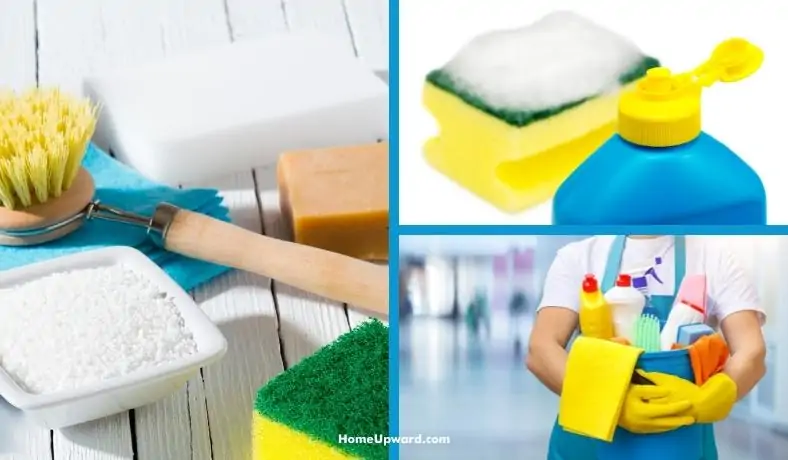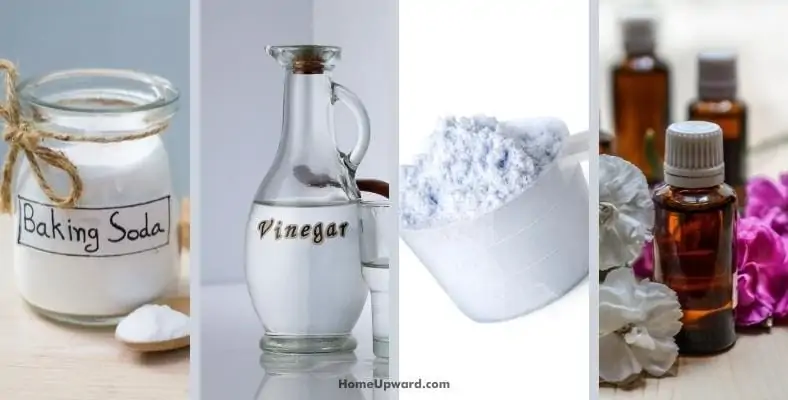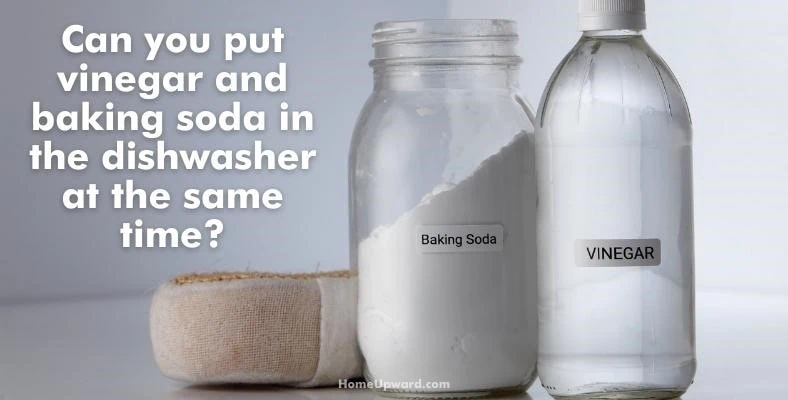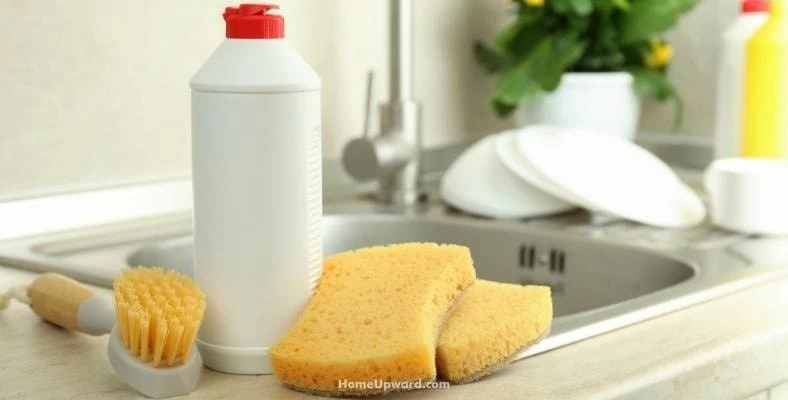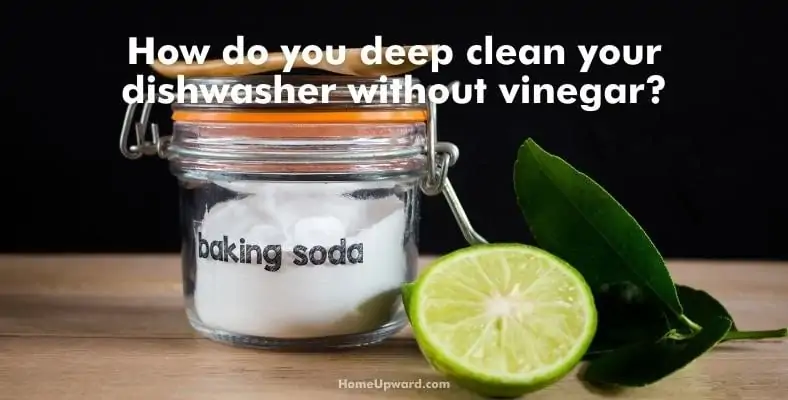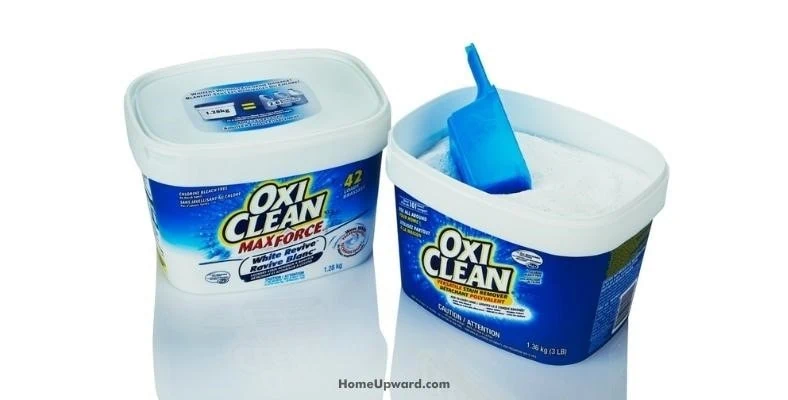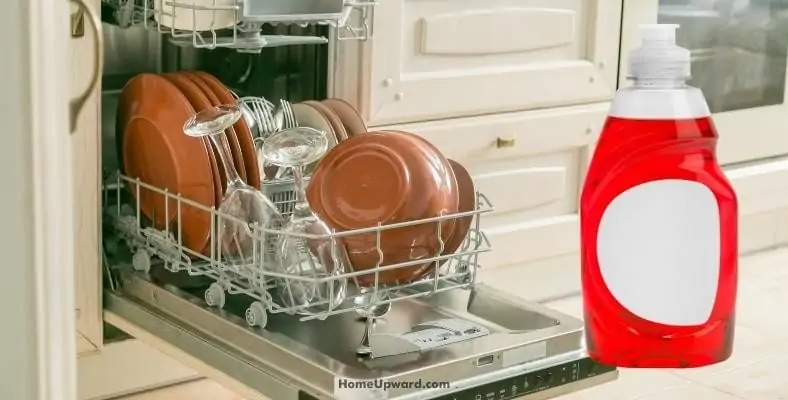Good news! Making a homemade dishwasher cleaner isn’t hard you’ve probably already got most of what you need nearby at home.
Read on to learn more!
Contents
- How To Make A Homemade Dishwasher Cleaner
- Can You Put Vinegar and Baking Soda in the Dishwasher at the Same Time?
- Homemade Dishwasher Detergent Recipe
- How Do You Deep Clean Your Dishwasher Without Vinegar?
- Can You Clean Your Dishwasher with OxiClean?
- How Can You Make Your Dishwasher Smell Better?
- Does Dish Soap Ruin a Dishwasher?
How To Make A Homemade Dishwasher Cleaner
Vinegar and baking soda are available in almost every household. The great thing about vinegar is not only can it be used to clean the dishwasher but also when it’s paired with baking soda its cleaning ability is even better.
These ingredients have strong odor-fighting properties that will remove any fish or wet dog smells in your appliances.
Homemade Dishwasher Cleaner (What You’ll Need)
Here are the basic ingredients you’ll need to make a winning cleaner that will do more than clean your dishwasher:
- Baking soda
- Distilled white vinegar
- Hydrogen peroxide
- Scented essential oils
We’ll use the first three to clean it while the scented essential oils are helpful to get rid of lingering foul odors and leave your machine smelling fresh.
How To Clean Your Dishwasher With a Homemade Dishwasher Cleaner
1. Unload the Dishes
It’s easy to understand why the dishwasher has to get unloaded before it’s cleaned. With a full dishwasher, reaching crevices is hard and your dishes will only get in the way of cleaning. Remove all of your dishes before moving forward.
2. Clean Out Food Particles
Accumulated food particles can start to decay and produce a foul odor. In addition to that, they can clog spraying nozzles and hurt the dishwasher’s efficiency.
Decaying food particles can also find their way to clean dishes giving them a bad smell – yech!
Cleaning out food particles left over will make it easier to clean the dishwasher in subsequent wash cycles. When taking out these food particles, pay extra attention to the door, especially in between the rubber seal, as materials tend to lodge themselves there.
Try to look out for food scraps between washing cycles so you can stay on top of the odor.
3. Wiping Around the Door Seal
Grease and grime in the dishwasher are notorious for finding small crevices to hide in and the door seal is a common site for unwanted food material. Wipe it down with a damp cloth and add a bit of vinegar is needed.
4. Take Out and Clean the Dishwasher Filter
Take out the dishwasher filter at the bottom of the machine and clean it using a needle or toothpick. This is a great way to remove lodged material from the holes of the dishwasher.
Soak the filter in hot water filled with laundry soap before beginning to user your needle or toothpick. After taking out the filter don’t forget the drain. Most dishwashers have an additional filter for the drain which should be removed and cleaned too.
5. Run a Dishwasher Cycle With Vinegar
After making sure there aren’t any more food particles or residue left over, place a dishwasher-safe cup filled with distilled white vinegar on the top rack and complete a washing cycle.
Vinegar is a great and very handy cleaning agent primarily because of acetic acid. Acetic acid not only disinfects and cleans but also deodorizes the dishwasher.
6. Run a Wash Cycle With Baking Soda
Run another wash cycle with baking soda at the top of the dishwasher rack. Sprinkle a small amount of baking soda at the bottom of the dishwasher to clear out any remaining grease and grime. The washing cycle should use hot water to sterilize the inside of the dishwasher and leave it sparkling clean.
7. Cleaning the Outside
Like every other surface, the outside of the dishwasher also needs a good shine. Different chemicals should be used to clean the stainless-steel handles, the glassy surfaces, and the rest of the dishwasher.
When cleaning the stainless-steel handles, use non-corrosive agents like a mixture of washing soda and soap. Avoid abrasive cleaners as they may scratch the surface and make it lose its luster. Sometimes, the difficult step in cleaning your dishwasher door is taking out pesky fingerprint marks. Diluted alcohol solutions are a quick remedy for this.
The rest of the dishwasher is relatively easy to clean. As long as the agents used are mild, there is no special requirement for cleaning.
Can You Put Vinegar and Baking Soda in the Dishwasher at the Same Time?
Vinegar and baking soda have proven to be perfect for cleaning all types of household surfaces, including the inside of the dishwasher. Separately, they do an exceptional job, but what happens when you mix them?
Vinegar and baking soda shouldn’t be mixed in the dishwasher at the same time. It will cause them to neutralize each other’s effects and you can end up with a giant foamy mess because of them bubbling over when they’re mixed.
Unlike what most people would probably guess, using vinegar and baking soda at the same time won’t amplify their cleaning properties.
This result is because of the difference in properties between vinegar and baking soda.
Homemade Dishwasher Detergent Recipe
Whether you need some homemade dishwasher detergent for daily use or to deal with an unexpected shortage there are several effective recipes. Here are some tips to make your own DIY dishwasher detergent that gets the job done well.
Homemade Dishwasher Detergent Recipe
Fill your detergent cup with:
- ¼ cup baking soda
- ¼ cup Borax or washing soda
- ¼ cup food-grade citric acid
- ¼ cup kosher salt
Baking soda is a natural abrasive and will rid the dirty dishes of their greasy exterior. Kosher salt is used to manage hard water pressures.
Citric acid is critical in washing dishes because of its mild acidic properties. In its absence, sieved lemon juice is a worthy substitute. Citric acid also helps reduce soap scum because of its natural cleaning properties.
Most grocery stores will stock these ingredients. The best part is all of these homemade natural dishwasher detergent ingredients are affordable and you can sometimes find and buy them in bulk to save even more money.
Keep in mind that it’s important to avoid laundry detergent in the dishwasher when using your DIY detergent because it could flood your kitchen with a wave of bubbles.
Using Your Homemade Detergent
To use your homemade dishwasher detergent, fill the detergent cup with the dry ingredients and run a wash cycle. You can use washing soda and borax interchangeably as either one will do.
For wet ingredients like lemon juice or vinegar, use a dishwasher-safe cup. Place this cup on the top rack of the dishwasher then run your usual hot water washing cycle.
How Do You Deep Clean Your Dishwasher Without Vinegar?
Don’t have any vinegar handy? That’s ok: baking soda and lemon juice are fantastic alternatives. Lemon juice placed on the top rack will spread evenly and coat your dishes in a fresh and tantalizing scent.
You can also find the acetic acid in vinegar in other pantry-available items you might have on hand.
Can You Clean Your Dishwasher with OxiClean?
Yes, you can use Oxiclean as a dishwasher soap because of its oxygenated cleaning properties. In fact, it works pretty well with the heat and pressure produced by the dishwasher’s steam jets.
How Can You Make Your Dishwasher Smell Better?
To improve the smell of the dishwasher complete an empty wash cycle with vinegar. Vinegar has disinfectant properties that will deodorize it.
For an extra sweet scent, add sieved and unsweetened lemon juice or an essential oil of your choice and run a wash cycle without detergent. Depending on your preferences you’ll probably like one of these essential oils the most:
- Orange
- Lemon
- Tea tree
- Lime
- Geranium
Does Dish Soap Ruin a Dishwasher?
Dish soap might seem like a clever substitute for the dishwasher but the truth is that it might cause a cascade of avoidable problems. These problems can cause irreversible damage to the dishwasher.
Dish soap poses a potential threat to the dishwasher’s plumbing and could cause a mess in the kitchen. Liquid dish soap like Dawn can foam up very badly and overflow your dishwasher and kitchen with foamy bubbles if you’re not careful.

